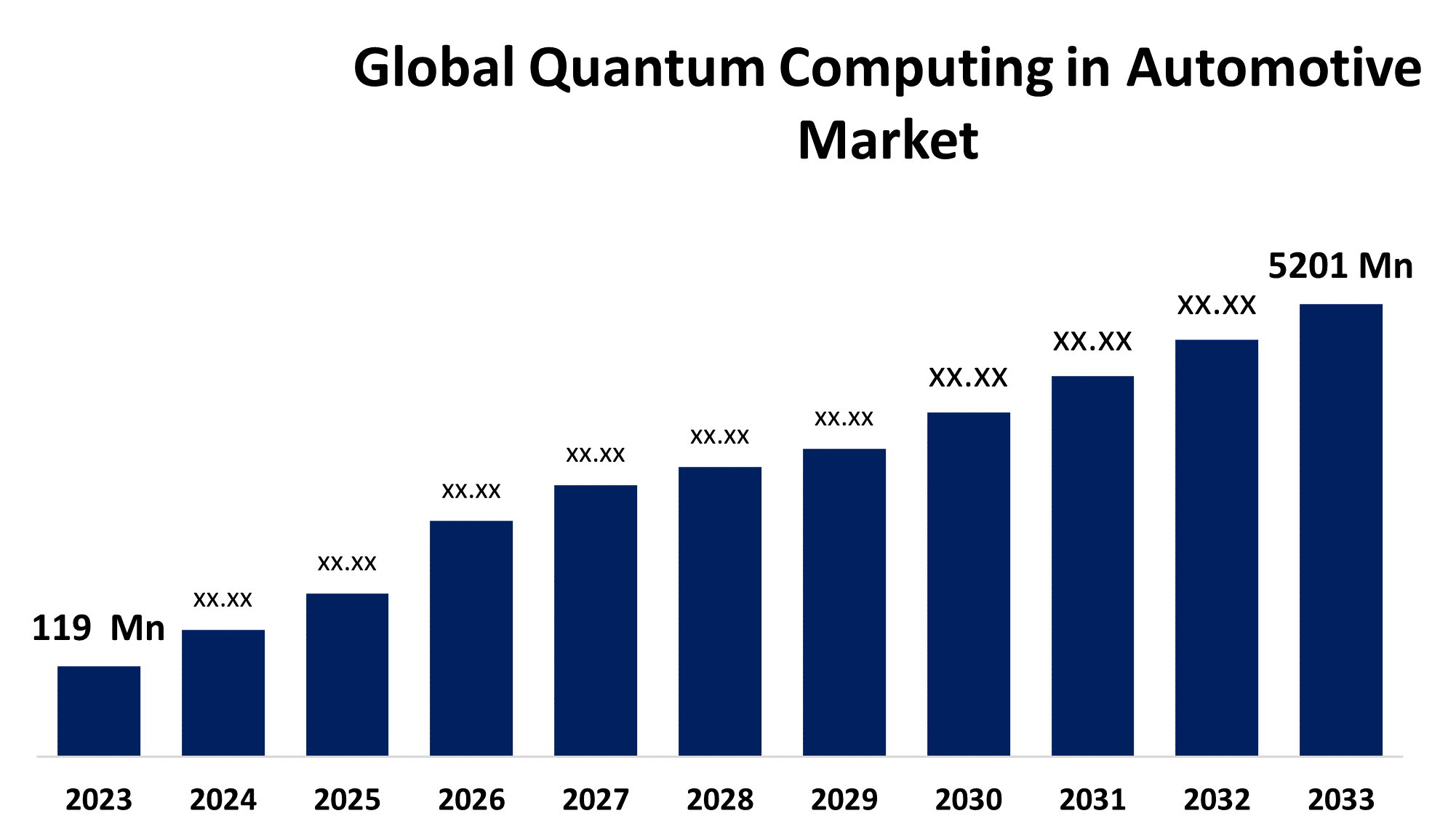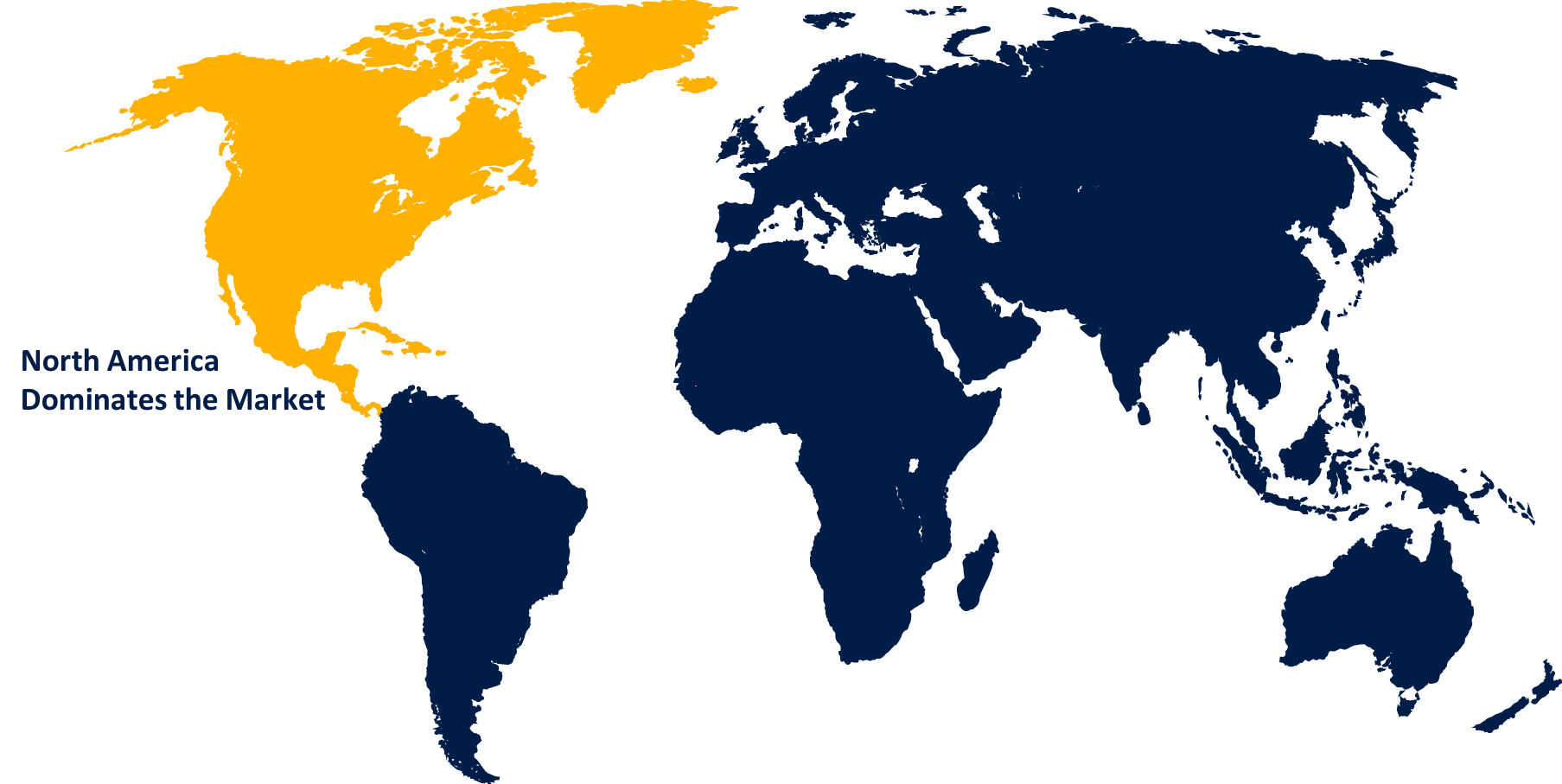Global Quantum Computing in Automotive Market Size, Share, and COVID-19 Impact Analysis, By Deployment (Cloud, On Premises), By Application (Route Planning & Traffic Management, Battery Optimization, Material Research, Production Planning & Scheduling), and By Region (North America, Europe, Asia-Pacific, Latin America, Middle East, and Africa), Analysis and Forecast 2023 – 2033
Industry: Automotive & TransportationGlobal Quantum Computing in Automotive Market Insights Forecasts to 2033
- The Global Quantum Computing in Automotive Market Size was Valued at USD 119 Million in 2023
- The Market Size is Growing at a CAGR of 45.90% from 2023 to 2033
- The Worldwide Quantum Computing in Automotive Market Size is Expected to Reach USD 5201 Million by 2033
- Asia Pacific is Expected to Grow the fastest during the forecast period.

Get more details on this report -
The Global Quantum Computing in Automotive Market Size is Anticipated to Exceed USD 5201 Million by 2033, Growing at a CAGR of 45.90% from 2023 to 2033.
Market Overview
Quantum computing is a new technology that utilizes quantum mechanics laws to address issues that traditional computers cannot handle. It can be utilized in the design of the car process to make numerous changes, including reduced fuel use and increased fuel economy. Although still in its early stages, quantum computing has been found handy in self-driving automobiles. Hyundai Motor Corporation and IonQ launched a technical agreement in 2022 to mimic EV battery chemical reactions with quantum computing technologies. In 2020, Mercedes-Benz and IBM Corporation signed a technological partnership to create next-generation lithium-sulfur batteries employing quantum computing technologies. Increased sales of electric vehicles will drive demand for upgraded batteries, opening up exponential growth prospects for numerous automotive and other hardware, software, and platform vendors for quantum computing. Quantum computing in the automotive market from the software sector is predicted to have a large share over the forecast period. Private and public entities are increasing their efforts in the creation of commercially viable and seamless physical quantum computers, as well as developments in the software environment, which are driving market growth.
Report Coverage
This research report categorizes the market for the global quantum computing in automotive market based on various segments and regions forecasts revenue growth and analyzes trends in each submarket. The report analyses the key growth drivers, opportunities, and challenges influencing the global quantum computing in automotive market. Recent market developments and competitive strategies such as expansion, product launch, and development, partnership, merger, and acquisition have been included to draw the competitive landscape in the market. The report strategically identifies and profiles the key market players and analyses their core competencies in each sub-segment of the global quantum computing in automotive market.
Global Quantum Computing in Automotive Market Report Coverage
| Report Coverage | Details |
|---|---|
| Base Year: | 2023 |
| Market Size in 2023: | USD 119 Million |
| Forecast Period: | 2023-2033 |
| Forecast Period CAGR 2023-2033 : | 45.90% |
| 2033 Value Projection: | USD 5201 Million |
| Historical Data for: | 2019-2022 |
| No. of Pages: | 200 |
| Tables, Charts & Figures: | 110 |
| Segments covered: | By Deployment, By Application, By Region |
| Companies covered:: | IBM Corporation, Microsoft Corporation, D-wave systems, inc, Amazon, Alphabet Inc., Rigetti & Co, LLC, PASQAL, Accenture plc, Terra Quantum, IONQ, and Others Key Vendors. |
| Pitfalls & Challenges: | COVID-19 Empact,Challenges, Future, Growth, & Analysis |
Get more details on this report -
Driving Factors
The automotive industry is focusing on creating new technologies to improve expertise in electric and hybrid vehicles, fuel cell optimization, connectivity, and self-driving cars, which is driving market growth. furthermore, when level 3, 4, and 5 autonomous vehicles become more common, passengers will be able to drive less physically. Quantum computing methods, for example, can rapidly process and calculate massive volumes of data supplied by modern systems such as LiDAR, RADAR, and image sensors. Furthermore, it is widely used for different applications in autonomous vehicles, such as autonomous vehicle optimization, data integration from many sensors, approximate 3D object identification, and automotive cybersecurity.
Restraining Factors
This is one of the most significant barriers to commercializing quantum computers. Qubits cannot be kept in their quantum mechanical state for an extended period due to their fragility and vulnerability to disturbance from changes in temperature, noise, and frequency in their surroundings. Furthermore, many blockchain-based solutions use the elliptic curve signature algorithm, which is currently not quantum-safe. The mechanical state of quantum is always changing due to problems in developing a marketable quantum machine, which limits the development of physical quantum computers.
Market Segmentation
The global quantum computing in automotive market share is classified into deployment and application.
- The cloud segment is expected to hold the largest share of the global quantum computing in automotive market during the forecast period.
Based on the deployment, the global quantum computing in automotive market is categorized into cloud, and on premises. Among these, the cloud segment is expected to hold the largest share of the global quantum computing in automotive market during the forecast period. The cloud-based quantum technology platform makes quantum computing resources and knowledge available to enterprises of all sizes, including startups and small firms that may lack the funds to invest in their hardware and infrastructure. Furthermore, a cloud-based quantum computing platform is less expensive than developing and maintaining quantum computing hardware and infrastructure in-house, which can be rather costly. These reasons, combined with the cost-effectiveness of cloud quantum computing, are driving market growth.
- The route planning & traffic management segment is expected to grow at the fastest CAGR during the forecast period.
Based on the application, the global quantum computing in automotive market is categorized into route planning & traffic management, battery optimization, material research, and production planning & scheduling. Among these, the route planning & traffic management segment is expected to grow at the fastest CAGR during the forecast period. Quantum computing can be used to determine the most effective routes for individuals or groups of cars, taking into account elements like traffic patterns, roads, and weather conditions. Quantum computing can reduce travel time and traffic congestion by creating real-time routes. Working on complicated and diverse vehicle types and conditions over time allows for more precise and efficient work and optimization.
Regional Segment Analysis of the Global Quantum Computing in Automotive Market
- North America (U.S., Canada, Mexico)
- Europe (Germany, France, U.K., Italy, Spain, Rest of Europe)
- Asia-Pacific (China, Japan, India, Rest of APAC)
- South America (Brazil and the Rest of South America)
- The Middle East and Africa (UAE, South Africa, Rest of MEA)
North America is anticipated to hold the largest share of the global quantum computing in automotive market over the predicted timeframe.

Get more details on this report -
North America is projected to hold the largest share of the global quantum computing in automotive market over the forecast period. The region's dominance originates primarily from the early adoption of quantum computing systems, as well as the presence of major technology companies like IBM Corporation, Microsoft Corporation, Alphabet Inc., D-Wave Systems Inc., Rigetti Computing, and Zapata Computing, among others. These businesses have a technology advantage and enough of capital to invest in innovation. For example, IBM Corporation has been conducting R&D on quantum computing since 1998. Alphabet Inc., Microsoft Corporation, D-wave Systems Inc., IonQ, and other companies are pioneering the development of quantum computing technologies. These firms can provide quantum computing solutions for the automotive industry, as well as some real-world applications based on quantum computing technology.
Asia Pacific is expected to grow at the fastest CAGR growth of the global quantum computing in automotive market during the forecast period. Asia Pacific is now known as the core of vehicle production, with the majority of automotive OEMs and manufacturers based in the area. The region's big automakers, China, India, Japan, and ANZ, are contemplating significant investments in quantum computer technologies. Several firms in the region, including Hyundai Motor and Aisin Group, are beginning to investigate the potential of quantum computing in electric vehicle batteries, self-driving automobiles, and data science.
Competitive Analysis:
The report offers the appropriate analysis of the key organizations/companies involved within the global quantum computing in automotive market along with a comparative evaluation primarily based on their product offering, business overviews, geographic presence, enterprise strategies, segment market share, and SWOT analysis. The report also provides an elaborative analysis focusing on the current news and developments of the companies, which includes product development, innovations, joint ventures, partnerships, mergers & acquisitions, strategic alliances, and others. This allows for the evaluation of the overall competition within the market.
List of Key Companies
- IBM Corporation
- Microsoft Corporation
- D-wave systems, inc
- Amazon
- Alphabet Inc.
- Rigetti & Co, LLC
- PASQAL
- Accenture plc
- Terra Quantum
- IONQ
- Others
Key Market Developments
- In September 2023, Rigetti & Co, LLC debuted its QCS on Microsoft's Azure Quantum platform with a public preview. All Azure Quantum customers can design and execute quantum applications using Rigetti's Aspen-M-2 80-qubit and Aspen-11 40-qubit superconducting quantum processors.
- In January 2023, PASQAL has announced the release of Pulser Studio, a no-code programming environment for neutral atom quantum computers. Pulser Studio allows users to create quantum registers and pulse sequences graphically, without the need for coding knowledge.
Key Target Audience
- Market Players
- Investors
- End-users
- Government Authorities
- Consulting And Research Firm
- Venture capitalists
- Value-Added Resellers (VARs)
Market Segment
This study forecasts revenue at global, regional, and country levels from 2020 to 2033. Spherical Insights has segmented the global quantum computing in automotive market based on the below-mentioned segments:
Global Quantum Computing in Automotive Market, By Deployment
- Cloud
- On Premises
Global Quantum Computing in Automotive Market, By Application
- Route Planning & Traffic Management
- Battery Optimization
- Material Research
- Production Planning & Scheduling
Global Quantum Computing in Automotive Market, By Regional
- North America
- US
- Canada
- Mexico
- Europe
- Germany
- Uk
- France
- Italy
- Spain
- Russia
- Rest of Europe
- Asia Pacific
- China
- Japan
- India
- South Korea
- Australia
- Rest of Asia Pacific
- South America
- Brazil
- Argentina
- Rest of South America
- Middle East & Africa
- UAE
- Saudi Arabia
- Qatar
- South Africa
- Rest of the Middle East & Africa
Frequently Asked Questions (FAQ)
-
1.What is the CAGR of the global quantum computing in automotive market over the forecast period?The global quantum computing in automotive market size is expected to grow from USD 119 million in 2023 to USD 5201 million by 2033, at a CAGR of 45.90% during the forecast period 2023-2033.
-
2.Which region is expected to hold the highest share in the global quantum computing in automotive market?North America is projected to hold the largest share of the global quantum computing in automotive market over the forecast period.
-
3.Who are the top key players in the quantum computing in automotive market?IBM Corporation, Microsoft Corporation, D-wave systems, inc, Amazon, Alphabet Inc., Rigetti & Co, LLC, PASQAL, Accenture plc, Terra Quantum, IONQ, and Others.
Need help to buy this report?